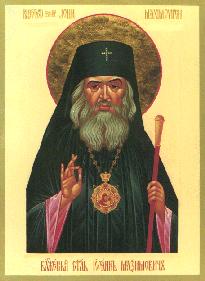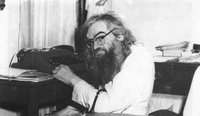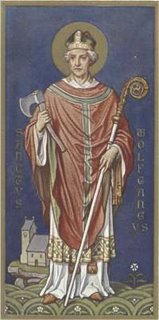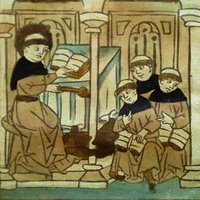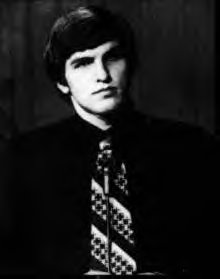Friday, January 12, 2007
Wednesday, January 10, 2007
A Pronouncement from the Holy Mountain of Athos
Karyae, 30 December 2006.
The recent visit of Pope Benedict XVI to the Ecumenical Patriarchate on the occasion of the feast-day of Saint Andrew (30th November 2006) and thereafter the visit by His Beatitude the Archbishop of Athens Christodoulos (14th December 2006) gave rise to a multitude of impressions, evaluations and reactions. We shall bypass those things that the secular Press had evaluated as positive or negative, to focus on those things that pertain to our salvation, for the sake of which we abandoned the world to live in the barrenness of the Holy Mountain.
As Monks of the Holy Mountain, we respect the Ecumenical Patriarchate, under whose jurisdiction we fall. We honour and venerate the Most Holy Ecumenical Patriarch Bartholomew and we rejoice in all that he has achieved and so diligently laboured for, in his love of God, for the Church. We particularly commemorate the stolid and untiring defence of the Ecumenical Patriarchate, amid the many unfavourable conditions that exist, as well as the impoverished local Orthodox Churches and the care that is taken to project the message of the Orthodox Church throughout the world. Furthermore, we the Monks of the Holy Mountain honour the Most Holy Church of Greece, from which most of us originate, and we respect His Beatitude the Primate.
However, the events that took place during the recent visits of the Pope to Fanarion and of His Beatitude the Archbishop to the Vatican brought immense sorrow to our hearts.
We desire and we struggle all of our life to safeguard the trust of the Holy Fathers, which was bequeathed to us by the holy Founders of our sacred Monasteries and the blessed reposed fathers before us. We strive to the best of our ability to live the sacrament of the Church and the unblemished Orthodox Faith, according to that which we are daily taught by the Divine Services, the sacred readings, and the teachings in general of the Holy Fathers which are set out in their writings and in the decisions of the Ecumenical Councils. We guard our dogmatic awareness “like the pupil of our eye”, and we reinforce it, by applying ourselves to God-pleasing labours and the meticulous study of the achievements of the holy Confessor Fathers when they confronted the miscellaneous heresies, and especially of our father among the saints, Gregory of Palamas, the Holy Martyrs of the Holy Mountain and the Holy Martyr Kosmas the First, whose sacred relics we venerate with every honour and whose sacred memory we incessantly celebrate. We are afraid to remain silent, whenever issues arise that pertain to the trust that our Fathers left us. Our responsibility, towards the most venerable fathers and brothers of the overall brotherhood of the Holy Mountain and towards the pious faithful of the Church who regard Athonite Monasticism as their non-negotiable guardian of sacred Tradition, weighs heavily upon our conscience,
The visits of the Pope at the Fanarion and the Archbishop’s visit at the Vatican may have secured certain benefits of a secular nature, however, during those visits, various other events took place which were not according to the customs of Orthodox Ecclesiology, or commitments were made that would neither benefit the Orthodox Church, nor any other heterodox Christians.
First of all, the Pope was received as though he were a canonical (proper) bishop of Rome. During the service, the Pope wore an omophoron; he was addressed by the Ecumenical Patriarch with the greeting “blessed is the one who comes in the name of the Lord” as though it were Christ the Lord; he blessed the congregation and he was commemorated as “most holy” and “His Beatitude the Bishop of Rome”. Furthermore, all of the Pope’s officiating clergy wore an omophoron during the Orthodox Divine Liturgy; also, the reciting of the Lord’s Prayer, his liturgical embrace with the Patriarch, were displays of something more than common prayer. And all of this, when the papist institution has not budged at all from its heretical teachings and its policy: On the contrary, the Pope is in fact visibly promoting and trying to reinforce the Unia along with the papist dogmas on primacy and infallibility, and is going even further, with inter-faith common prayers and the pan-religious hegemony of the Pope of Rome that is discerned therein.
As for the reception of the Pope in Fanarion, we are especially grieved by the fact that all of the Media kept repeating the same, incorrect information, that the psalms that were (unduly) sung at the time had been composed by Monks of the Holy Mountain. We take this opportunity to responsibly inform all pious Christians that their composer was not, and could never be, a monk of the Holy Mountain.
Then there is the matter of the attempt by His Beatitude the Archbishop of Athens to commence relations with the Vatican on social, cultural and bio-ethical issues, as well as the objective to mutually defend the Christian roots of Europe (positions which are also found in the Common Declaration of the Pope and the Patriarch in the Fanarion), both of which may seem innocuous or even positive, given that their aim is to cultivate peaceful human relations. Nevertheless, it is important that all these do not give the impression that the West and Orthodoxy continue to have the same bases, or lead one into forgetting the distance that separates the Orthodox Tradition from that which is usually presented as the “European spirit”. (Western) Europe is burdened with a series of anti-Christian institutions and acts, such as the Crusades, the “Holy” Inquisition, slave trading and colonization. It is burdened with the tragic division which took on the form of the schism of Protestantism; the devastating world wars, and the man-centered humanism and its atheist view.
All of these are the consequence of Rome’s theological deviations from Orthodoxy. One after the other, the Papist and the Protestant heresies gradually removed the humble Christ of Orthodoxy and in His place, they enthroned haughty Man. The holy bishop Nicholas of Ochrid and Zitsa wrote the following from Dachau: "What, then, is Europe? The Pope and Luther.... This is what Europe is, at its core, ontologically and historically". The blessed Elder Justin Popovitch supplements the above: "The 2nd Vatican Synod comprises the rebirth of every kind of European humanism.... because the Synod persistently adhered to the dogma on the Pope’s infallibility" and he surmises: "Undoubtedly, the authorities and the powers of (western) European culture and civilization are Christ-expellers".
This is why it is so important to project the humble morality of Orthodoxy and to support the truly Christian roots of the united Europe; the roots that Europe had during the first Christian centuries, during the time of the catacombs and of the seven holy Ecumenical Councils. It is advisable for Orthodoxy to not tax itself with foreign sins, and furthermore, the impression should not be given to those who became de-Christianised in reaction to the sidetracking of Western-style Christianity, that Orthodoxy is related to it, thus ceasing to testify that it is the only authentic Faith in Christ, and the only hope of the peoples of Europe.
[We note] The Roman Catholics’ inability to disentangle themselves from the decisions of their pursuant (and according to them, Ecumenical) Synods, which had legitimised the Filioque, the Primacy, the Infallibility, the secular authority of the Roman Pontiff, ‘created Grace’, the immaculate conception of the Holy Mother, the Unia.
Despite all these, we Orthodox continue the so-called traditional exchanges of visits, bestowing honours befitting an Orthodox Bishop on the Pope and totally disregarding a series of Sacred Canons which forbid common prayers, while the theological dialogue repeatedly flounders, and, after being dredged from the depths, it again sinks down.
All indications lead to the conclusion that the Vatican is not orienting itself to discard its heretical teachings, but only to “re-interpret” them – in other words, to veil them.
Roman Catholic ecclesiology varies, from one circular to the other; from the so-called “open” ecclesiology of the Encyclical "Ut Unum Sint", to the ecclesiological exclusivity of the Encyclical "Dominus Jesus". It should be noted that both of the aforementioned views are contrary to Orthodox Ecclesiology. The self-awareness of the holy Orthodox Church as the only One, Holy, Catholic (overall) and Apostolic Church does not allow for the recognition of other, heterodox churches and confessions as “sister churches”. “Sister Churches” are only the local Orthodox Churches of the same faith. No homonymous reference to “sister churches” other than the Orthodox one is theologically permissible.
The “Filioque” is promoted by the Roman catholic side as yet another legal expression of the teaching regarding the procession of the Holy Spirit, and theologically equivalent to the Orthodox teaching that procession is “only from the Father” – a view that is unfortunately supported by some of our own theologians.
Besides, the Pontiff is maintaining the Primacy as an inalienable privilege, as one can tell from the recent erasure of the title “Patriarch of the West” by the current Pope Benedict XVI; also from his reference to the worldwide mission of the Apostle Peter and his successors during his homily in the Patriarchal Temple, as well as from his also recent speech, which included the following: "...within the society, with the Successors of the Apostles, whose visible unity is guaranteed by the Successor of the Apostle Peter, the Ukrainian Catholic Community managed to preserve the Sacred Tradition alive, in its integrity" (Catholic Newspaper, No.3046/18-4-2006).
The Unia is being reinforced and reassured in many and various ways, despite the proclamations by the Pope to the contrary. This dishonest stance is witnessed, apart from other instances, by the provocative intervention of the previous Pope, John-Paul II, which led the Orthodox-Roman catholic dialogue in Baltimore into a disaster, as well as by the letter sent by the current Pope to the Cardinal Ljubomir Husar, the Uniate Archbishop of Ukraine. In this letter dated 22/2/2006, the following is emphatically stressed: "It is imperative to secure the presence of the two great carriers of the only Tradition (the Latin and the Eastern).... The mission that the Greek Catholic Church has undertaken, being in full communion with the Successor of the Apostle Peter, is two-fold: on one side, it must visibly preserve the eastern Tradition inside the Catholic Church; on the other, it must favour the merging of the two traditions, testifying that they not only can coordinate between themselves, but that they also constitute a profound union amid their variety".
Seen in this light, polite exchanges such as the visits of the Pope to Fanarion and the Archbishop of Athens to the Vatican, without the prerequisite of a unity in the Faith, may on the one hand create false impressions of unity and thus turn away the heterodox who could have looked towards Orthodoxy as being the true Church, and on the other hand, blunt the dogmatic sensor of many Orthodox. Even more, they may push some of the faithful and pious Orthodox, who are deeply concerned over what is taking place inopportunely and against the Sacred Canons, to detach themselves from the corpus of The Church and create new schisms.
Thus, out of love for our Orthodoxy, but with pain as regards the unity of the Church, and with a view to preserve the Orthodox Faith free of all innovations, we proclaim in every direction that which was proclaimed by the Extraordinary, Double, Holy Assembly of our Sacred Community of the Holy Mountain on the 9th / 22nd of April 1980:
"We believe that our Holy Orthodox Church is the One, Holy, Catholic and Apostolic Church of Christ, having the fullness of Grace and the Truth, and for this reason, an uninterrupted Apostolic Succession. On the contrary, the “churches” and the “confessions” of the West, having distorted the faith of the Gospel, the Apostles and the Fathers on many points, are deprived of the hallowing Grace, the true Sacraments and the Apostolic Succession...
Dialogues with the heterodox - if they are intended to inform them about the Orthodox Faith so that when they become receptive of Divine enlightenment and their eyes are opened they might return to the Orthodox Faith – are not condemned.
In no way should a theological dialogue be accompanied by common prayers, participation in liturgical assemblies and worship by either side and any other activities that might give the impression that our Orthodox Church acknowledges the Roman Catholics as a complete Church and the Pope as a canonical (proper) Bishop of Rome. Such acts mislead the Orthodox as well as the Roman Catholic faithful, who are given a false impression of what Orthodoxy thinks of them....
With the Grace of God, the Holy Mountain remains faithful - as do the Orthodox people of the Lord - to the Faith of the Holy Apostles and the Holy Fathers, and also out of love for the heterodox, who are essentially helped, when the Orthodox with their steadfast Orthodox stance, point out the extent of their spiritual ailment and the way they can be cured.
The failed attempts for union during the past teach us that for a permanent union, according to the will of God, within the Truth of The Church, the prerequisite is a different kind of preparation and course, than those which were followed in the past and appear to be followed to this day".
By all of the Representatives and Superiors of the common Assembly of the twenty Sacred Monasteries of the Holy Mountain Athos.
------------
Originally posted at the Ely Forum by Fr. Michael
The recent visit of Pope Benedict XVI to the Ecumenical Patriarchate on the occasion of the feast-day of Saint Andrew (30th November 2006) and thereafter the visit by His Beatitude the Archbishop of Athens Christodoulos (14th December 2006) gave rise to a multitude of impressions, evaluations and reactions. We shall bypass those things that the secular Press had evaluated as positive or negative, to focus on those things that pertain to our salvation, for the sake of which we abandoned the world to live in the barrenness of the Holy Mountain.
As Monks of the Holy Mountain, we respect the Ecumenical Patriarchate, under whose jurisdiction we fall. We honour and venerate the Most Holy Ecumenical Patriarch Bartholomew and we rejoice in all that he has achieved and so diligently laboured for, in his love of God, for the Church. We particularly commemorate the stolid and untiring defence of the Ecumenical Patriarchate, amid the many unfavourable conditions that exist, as well as the impoverished local Orthodox Churches and the care that is taken to project the message of the Orthodox Church throughout the world. Furthermore, we the Monks of the Holy Mountain honour the Most Holy Church of Greece, from which most of us originate, and we respect His Beatitude the Primate.
However, the events that took place during the recent visits of the Pope to Fanarion and of His Beatitude the Archbishop to the Vatican brought immense sorrow to our hearts.
We desire and we struggle all of our life to safeguard the trust of the Holy Fathers, which was bequeathed to us by the holy Founders of our sacred Monasteries and the blessed reposed fathers before us. We strive to the best of our ability to live the sacrament of the Church and the unblemished Orthodox Faith, according to that which we are daily taught by the Divine Services, the sacred readings, and the teachings in general of the Holy Fathers which are set out in their writings and in the decisions of the Ecumenical Councils. We guard our dogmatic awareness “like the pupil of our eye”, and we reinforce it, by applying ourselves to God-pleasing labours and the meticulous study of the achievements of the holy Confessor Fathers when they confronted the miscellaneous heresies, and especially of our father among the saints, Gregory of Palamas, the Holy Martyrs of the Holy Mountain and the Holy Martyr Kosmas the First, whose sacred relics we venerate with every honour and whose sacred memory we incessantly celebrate. We are afraid to remain silent, whenever issues arise that pertain to the trust that our Fathers left us. Our responsibility, towards the most venerable fathers and brothers of the overall brotherhood of the Holy Mountain and towards the pious faithful of the Church who regard Athonite Monasticism as their non-negotiable guardian of sacred Tradition, weighs heavily upon our conscience,
The visits of the Pope at the Fanarion and the Archbishop’s visit at the Vatican may have secured certain benefits of a secular nature, however, during those visits, various other events took place which were not according to the customs of Orthodox Ecclesiology, or commitments were made that would neither benefit the Orthodox Church, nor any other heterodox Christians.
First of all, the Pope was received as though he were a canonical (proper) bishop of Rome. During the service, the Pope wore an omophoron; he was addressed by the Ecumenical Patriarch with the greeting “blessed is the one who comes in the name of the Lord” as though it were Christ the Lord; he blessed the congregation and he was commemorated as “most holy” and “His Beatitude the Bishop of Rome”. Furthermore, all of the Pope’s officiating clergy wore an omophoron during the Orthodox Divine Liturgy; also, the reciting of the Lord’s Prayer, his liturgical embrace with the Patriarch, were displays of something more than common prayer. And all of this, when the papist institution has not budged at all from its heretical teachings and its policy: On the contrary, the Pope is in fact visibly promoting and trying to reinforce the Unia along with the papist dogmas on primacy and infallibility, and is going even further, with inter-faith common prayers and the pan-religious hegemony of the Pope of Rome that is discerned therein.
As for the reception of the Pope in Fanarion, we are especially grieved by the fact that all of the Media kept repeating the same, incorrect information, that the psalms that were (unduly) sung at the time had been composed by Monks of the Holy Mountain. We take this opportunity to responsibly inform all pious Christians that their composer was not, and could never be, a monk of the Holy Mountain.
Then there is the matter of the attempt by His Beatitude the Archbishop of Athens to commence relations with the Vatican on social, cultural and bio-ethical issues, as well as the objective to mutually defend the Christian roots of Europe (positions which are also found in the Common Declaration of the Pope and the Patriarch in the Fanarion), both of which may seem innocuous or even positive, given that their aim is to cultivate peaceful human relations. Nevertheless, it is important that all these do not give the impression that the West and Orthodoxy continue to have the same bases, or lead one into forgetting the distance that separates the Orthodox Tradition from that which is usually presented as the “European spirit”. (Western) Europe is burdened with a series of anti-Christian institutions and acts, such as the Crusades, the “Holy” Inquisition, slave trading and colonization. It is burdened with the tragic division which took on the form of the schism of Protestantism; the devastating world wars, and the man-centered humanism and its atheist view.
All of these are the consequence of Rome’s theological deviations from Orthodoxy. One after the other, the Papist and the Protestant heresies gradually removed the humble Christ of Orthodoxy and in His place, they enthroned haughty Man. The holy bishop Nicholas of Ochrid and Zitsa wrote the following from Dachau: "What, then, is Europe? The Pope and Luther.... This is what Europe is, at its core, ontologically and historically". The blessed Elder Justin Popovitch supplements the above: "The 2nd Vatican Synod comprises the rebirth of every kind of European humanism.... because the Synod persistently adhered to the dogma on the Pope’s infallibility" and he surmises: "Undoubtedly, the authorities and the powers of (western) European culture and civilization are Christ-expellers".
This is why it is so important to project the humble morality of Orthodoxy and to support the truly Christian roots of the united Europe; the roots that Europe had during the first Christian centuries, during the time of the catacombs and of the seven holy Ecumenical Councils. It is advisable for Orthodoxy to not tax itself with foreign sins, and furthermore, the impression should not be given to those who became de-Christianised in reaction to the sidetracking of Western-style Christianity, that Orthodoxy is related to it, thus ceasing to testify that it is the only authentic Faith in Christ, and the only hope of the peoples of Europe.
[We note] The Roman Catholics’ inability to disentangle themselves from the decisions of their pursuant (and according to them, Ecumenical) Synods, which had legitimised the Filioque, the Primacy, the Infallibility, the secular authority of the Roman Pontiff, ‘created Grace’, the immaculate conception of the Holy Mother, the Unia.
Despite all these, we Orthodox continue the so-called traditional exchanges of visits, bestowing honours befitting an Orthodox Bishop on the Pope and totally disregarding a series of Sacred Canons which forbid common prayers, while the theological dialogue repeatedly flounders, and, after being dredged from the depths, it again sinks down.
All indications lead to the conclusion that the Vatican is not orienting itself to discard its heretical teachings, but only to “re-interpret” them – in other words, to veil them.
Roman Catholic ecclesiology varies, from one circular to the other; from the so-called “open” ecclesiology of the Encyclical "Ut Unum Sint", to the ecclesiological exclusivity of the Encyclical "Dominus Jesus". It should be noted that both of the aforementioned views are contrary to Orthodox Ecclesiology. The self-awareness of the holy Orthodox Church as the only One, Holy, Catholic (overall) and Apostolic Church does not allow for the recognition of other, heterodox churches and confessions as “sister churches”. “Sister Churches” are only the local Orthodox Churches of the same faith. No homonymous reference to “sister churches” other than the Orthodox one is theologically permissible.
The “Filioque” is promoted by the Roman catholic side as yet another legal expression of the teaching regarding the procession of the Holy Spirit, and theologically equivalent to the Orthodox teaching that procession is “only from the Father” – a view that is unfortunately supported by some of our own theologians.
Besides, the Pontiff is maintaining the Primacy as an inalienable privilege, as one can tell from the recent erasure of the title “Patriarch of the West” by the current Pope Benedict XVI; also from his reference to the worldwide mission of the Apostle Peter and his successors during his homily in the Patriarchal Temple, as well as from his also recent speech, which included the following: "...within the society, with the Successors of the Apostles, whose visible unity is guaranteed by the Successor of the Apostle Peter, the Ukrainian Catholic Community managed to preserve the Sacred Tradition alive, in its integrity" (Catholic Newspaper, No.3046/18-4-2006).
The Unia is being reinforced and reassured in many and various ways, despite the proclamations by the Pope to the contrary. This dishonest stance is witnessed, apart from other instances, by the provocative intervention of the previous Pope, John-Paul II, which led the Orthodox-Roman catholic dialogue in Baltimore into a disaster, as well as by the letter sent by the current Pope to the Cardinal Ljubomir Husar, the Uniate Archbishop of Ukraine. In this letter dated 22/2/2006, the following is emphatically stressed: "It is imperative to secure the presence of the two great carriers of the only Tradition (the Latin and the Eastern).... The mission that the Greek Catholic Church has undertaken, being in full communion with the Successor of the Apostle Peter, is two-fold: on one side, it must visibly preserve the eastern Tradition inside the Catholic Church; on the other, it must favour the merging of the two traditions, testifying that they not only can coordinate between themselves, but that they also constitute a profound union amid their variety".
Seen in this light, polite exchanges such as the visits of the Pope to Fanarion and the Archbishop of Athens to the Vatican, without the prerequisite of a unity in the Faith, may on the one hand create false impressions of unity and thus turn away the heterodox who could have looked towards Orthodoxy as being the true Church, and on the other hand, blunt the dogmatic sensor of many Orthodox. Even more, they may push some of the faithful and pious Orthodox, who are deeply concerned over what is taking place inopportunely and against the Sacred Canons, to detach themselves from the corpus of The Church and create new schisms.
Thus, out of love for our Orthodoxy, but with pain as regards the unity of the Church, and with a view to preserve the Orthodox Faith free of all innovations, we proclaim in every direction that which was proclaimed by the Extraordinary, Double, Holy Assembly of our Sacred Community of the Holy Mountain on the 9th / 22nd of April 1980:
Dialogues with the heterodox - if they are intended to inform them about the Orthodox Faith so that when they become receptive of Divine enlightenment and their eyes are opened they might return to the Orthodox Faith – are not condemned.
In no way should a theological dialogue be accompanied by common prayers, participation in liturgical assemblies and worship by either side and any other activities that might give the impression that our Orthodox Church acknowledges the Roman Catholics as a complete Church and the Pope as a canonical (proper) Bishop of Rome. Such acts mislead the Orthodox as well as the Roman Catholic faithful, who are given a false impression of what Orthodoxy thinks of them....
With the Grace of God, the Holy Mountain remains faithful - as do the Orthodox people of the Lord - to the Faith of the Holy Apostles and the Holy Fathers, and also out of love for the heterodox, who are essentially helped, when the Orthodox with their steadfast Orthodox stance, point out the extent of their spiritual ailment and the way they can be cured.
The failed attempts for union during the past teach us that for a permanent union, according to the will of God, within the Truth of The Church, the prerequisite is a different kind of preparation and course, than those which were followed in the past and appear to be followed to this day".
By all of the Representatives and Superiors of the common Assembly of the twenty Sacred Monasteries of the Holy Mountain Athos.
------------
Originally posted at the Ely Forum by Fr. Michael


